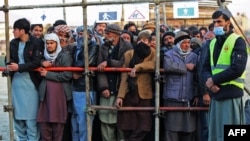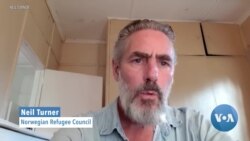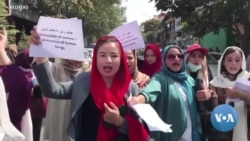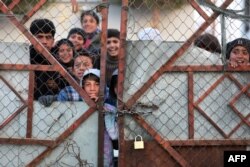The acting head of the U.N. assistance mission in Afghanistan on Monday urged the Taliban to reverse its ban on the employment of women by nongovernmental organizations.
"Millions of Afghans need humanitarian assistance and removing barriers is vital," UNAMA said.
The agency said acting head and humanitarian coordinator Ramiz Alakbarov met Monday with Taliban Economy Minister Mohammad Hanif in Kabul to urge the policy to be reversed.
At least four foreign NGOs have announced a suspension in services in Afghanistan in response to the ban, including Save the Children, the Norwegian Refugee Council, CARE International and the International Rescue Committee.
“We cannot effectively reach children, women and men in desperate need in Afghanistan without our female staff,” said a joint statement Sunday by the Norwegian Refugee Council (NRC), Save the Children and CARE International.
The leaders of these groups warned that the Taliban ban would impact delivery of lifesaving assistance to millions of Afghans and affect thousands of jobs during an “enormous economic crisis” facing the impoverished country.
“Whilst we gain clarity on this announcement, we are suspending our programmes, demanding that men and women can equally continue our lifesaving assistance in Afghanistan,” the statement said.
The three NGOs run critical health care, education, child protection and nutrition programs in the conflict-ravaged country where the United Nations says more than half the population, estimated at 40 million people, needs some form of humanitarian aid.
Separately, the International Rescue Committee (IRC) said Sunday it was suspending Afghan humanitarian operations, saying its ability to deliver services relies on female staff at all levels of the organization. “If we are not allowed to employ women, we are not able to deliver to those in need,” it said, noting that IRC employs around 8,000 people, more than 3,000 of whom are women.
The Taliban ministry of economy in a letter Saturday ordered national and international NGOs to immediately suspend Afghan female employees from coming to work “until further notice” for allegedly violating mandatory Islamic dress codes by not properly wearing hijabs. It threatened to cancel work permits of organizations found in breach of the order.
The NRC has assisted about 850,000 people over the last year in Afghanistan in the fields of water, sanitation, shelter and education.
Neil Turner, the NRC chief, denounced the ban as an “egregious” step by the Taliban. In his video comments to VOA, Turner disputed Taliban claims that NGOs were not in compliance with Islamic dress.
“We have been presented with no evidence of this whatsoever. We always work in a culturally sensitive way and the dress of our female staff has of course been as it should,” Turner said. “They are expert at accessing some of these areas where cultural sensitivities exist and we have been doing that effectively and in compliance with everything that the Taliban authorities have been expecting up to now,” he said.
Reshma Azmi, the CARE Afghanistan deputy director of programs, told VOA via email that 38% of the 900 staff in her organization are females. The aid group has already helped more than 700,000 Afghans, including more than half a million women, she said.
“Cultural sensitivities prevent men's aid workers from replacing our women colleagues, as they cannot easily reach and engage with women beneficiaries,” she explained. “This is especially crucial for the most vulnerable women and girls such as widows and women-headed households, who might not have a man in their family to engage with on their behalf,” Azmi added.
U.N. Secretary-General Antonio Guterres said that he was “deeply disturbed” by the ban, noting in a statement that national and foreign NGOs “are helping more than 28 million Afghans who depend on humanitarian aid to survive.”
The United States also denounced the Taliban move, warning it would disrupt vital and life-saving assistance to millions of people in Afghanistan.
“Women are central to humanitarian operations around the world. This decision could be devastating for the Afghan people,” Secretary of State Antony Blinken wrote on Twitter.
The Taliban group’s chief spokesman, Zabihullah Mujahid, rejected the U.S.-led criticism of the NGO-related directive, calling it interference in Afghanistan’s internal matters.
“All those institutions wanting to operate in Afghanistan are obliged to comply with the rules and regulations of our country,” Mujahid said. “We do not allow anyone to talk rubbish or make threats regarding the decisions of our leaders under the title of humanitarian aid.”
The NGO ban followed last week’s abrupt suspension of female students’ access to public and private universities across Afghanistan, a move which drew strong backlash from the international community and calls for it to be reversed.
The Taliban have steadily excluded women from public life and education since retaking control of the country in August 2021. They require women to cover faces while in public and avoid long road trips unless accompanied by male relatives. Girls have also been barred from attending secondary schools past the sixth grade.
Aid agencies say the 2021 Taliban takeover of Afghanistan and withdrawal of U.S.-led international troops have plunged the country into economic turmoil, worsening an already alarming hunger crisis and driving millions more into poverty.
The economic crisis stems from sanctions on Taliban rulers, banking-sector restrictions and suspension of foreign development assistance for the heavily aid-dependent country.









